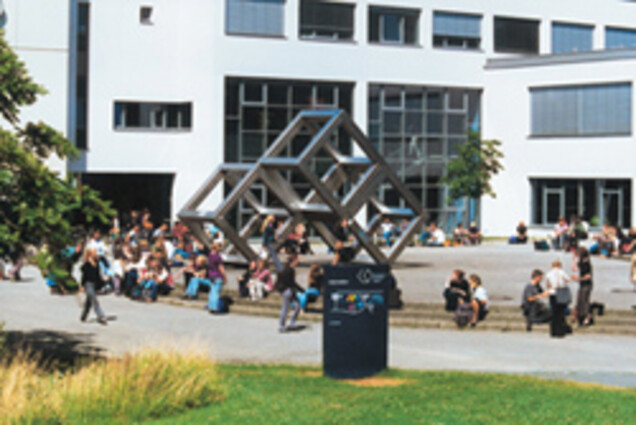
Freiburg University of Education
There are currently 250 academic staff and some 5,100 students at the Freiburg University of Education. With its broad range of Bachelor and Master courses along with teacher training programmes*, the University offers excellent research-based first-degree level qualifications and further education complemented by a large share of professionally accompanied practical and application-based modules. The change from State Examination to the Bologna structure means that the University of Education now works in close cooperation with the Albert Ludwigs University, Freiburg. The new Freiburg Advanced Center of Education (FACE) provides a forum for collaborative work in Teacher Education and is the central focus for all key players. FACE combines Initial Teacher Education, Practice and In-service Training, Educational Research and Quality Assurance. FACE’s online campus provides entrants to the teaching profession with all the most important information, reforms, and opportunities for the exchange of ideas, and thus a space to develop their professional identity.
This cooperation means that the University of Education covers Teacher Education for all levels: Primary, Secondary 1 and Secondary 2. Moreover, frequently the University’s international/languages and maths/natural science profile serves as the decisive factor for choosing the Freiburg University.
- excellent research-based first-degree level qualifications and further education
- professional integration of theory and practice
- international/languages and maths/natural science profile
Main academic focus areas
Intercultural and cross-border courses Research with an emphasis on Europe
This focus area comprises a large variety of undergraduate and graduate courses as well as renowned research projects that fully and systematically exploit Freiburg’s locational advantage.
Examples of undergraduate courses
in this field:
- European Teacher Programme: Graduates are trained to teach a subject bilingually – in German and English or French – and at the same time acquire intercultural skills, which will take on increasing importance in the future.
- Integrated Course of Study: German and French students training to become teachers study together, alternating between the Freiburg University and the Université de haute Alsace in Mulhouse, before receiving the “1st German State Exam” and the qualification to teach at primary schools in Germany and France.
International options for continuing
education:
- Master’s Course in German as a Second and a Foreign Language
Various research projects on language acquisition and on multilinguality, as well as the European PAMINA project, for instance, which investigates European identity, provide additional new stimuli not only for this field but also for the development of new forms of teaching and learning.
Emphasis on mathematics/natural sciences in research and teaching
This focus area encompasses a large variety of courses as well as numerous interesting research projects run by the University. In addition, various chemistry, physics, geography and maths “learning labs” prepare students adequately for their future (practical and experimental) tasks. Here, too, theory and practice are closely linked: experiments in classes, e.g. as part of the NAWIlino project provide students with insight into the everyday life of a teacher. Involvement in topical research projects provides an impression of what it means to learn by discovering: for example the EU project mascil (research- and discovery-based in the classroom) or the project MATHElino (research the learn process of Kindergarten kids and primary school children).
Other features of Freiburg University
Targeted promotion of young researchers
Various PhD programmes and a large number of other (European) research projects promote a wide range of young researchers. Apart from the programme mentioned above, these include the research programme “Learning for the Knowledge Society”, “Task-based Learning and Teaching” and “Being Able to Explain”. In total, the University runs approx. 90 research projects. This lends the Freiburg University of Education a key position within Baden-Württemberg in the promotion of young researchers.
More than studying
Finally, the University boasts an equally ambitious and varied cultural campus life. The University offers numerous opportunities for creative activity: the University choir, orchestra, big band, sports activities, a literary workshop, drama groups in German, English and French, and the campus radio station, to name just a few..
Courses offered at the Freiburg University of Education
Bachelor of Arts · Bachelor of Science · Master of Education TEACHER TRAINING
- Primary schools
- European Teaching Training for primary schools
- Teaching Training Primary / Integrated German-French Teaching Training (Cursus Intégré)
- Lower secondary schools
- European Teaching Training for lower secondary schools
- Higher Teaching Training colleges to professional
- High School
Bachelor of Arts · Bachelor of Science
- Education (B.A.)
- Early Education (B.A.)
- Health Education (B.Sc.)
- German as a Second or a Foreign Language (B.A.)
Master of Arts
- Psychology of Education
- German as a Second or a Foreign Language
- Educational Science
- Health Education
- Media in Education
- Instructional and School Development
Doctoral degrees
Post-doctoral degrees
Pädagogische Hochschule Freiburg
University of Education
Kunzenweg 21 · 79117 Freiburg
Telefon +49 761 682-0
Telefax +49 761 682-402
E-Mail: poststelle@ph-freiburg.de Internet: www.ph-freiburg.de
Pädagogische Hochschule Freiburg
An der Pädagogischen Hochschule Freiburg studieren derzeit ca. 5.000 Studierende – betreut werden sie von 250 Dozentinnen und Dozenten. Mit einem breiten Spektrum an Bachelor- und Masterstudiengängen bietet die Hochschule eine exzellente forschungsbasierte Erstausbildung bzw. Weiterbildung, die sich durch ein hohes Maß an sinnvoll integrierten und professionell begleiteten anwendungs- und praxisorientierten Anteilen auszeichnen. Seit der Umstellung des Staatsexamens auf die Bologna-Struktur kooperiert die Pädagogische Hochschule eng mit der Albert-Ludwigs-Universität Freiburg. Mit dem Freiburg Advanced Center of Education (FACE) hat die Lehrkräftebildung in Freiburg ein neues Gesicht bekommen. Das FACE der beiden Hochschulen bildet ein Netzwerk für die gemeinsame Arbeit an der Lehrkräftebildung und ist damit die zentrale Struktur für alle Akteur/-innen. Vier tragende Säulen sind unter dem Dach des FACE zusammengeführt: Lehre, Praxis und Weiterbildung, Bildungsforschung sowie Qualitätssicherung. FACE bietet ein Onlineportal bzw. einen Onlinecampus mit allen wichtigen Informationen, Neuerungen und Austauschmöglichkeiten für das Lehramt. Die Studierenden erhalten dadurch einen Raum für ihr Selbstverständnis als Lehramtsanwärter/-innen.
Aufgrund dieser Kooperation deckt die Pädagogische Hochschule alle Stufen des Lehramtes ab: Primarstufe, Sekundarstufe 1 und Sekundarstufe 2.
Weiterhin ist das international-sprachliche und mathematisch-naturwissenschaftliche Profil der Hochschule immer wieder ausschlaggebend für die Studiumswahl an der Pädagogischen Hochschule Freiburg.
Inhaltliche Schwerpunkte
Interkulturelle und grenzüberschreitende Studien – Forschung mit Europa-Schwerpunkt
Dieser Schwerpunkt zeigt sich in einem vielfältigen grundständigen sowie weiterbil-dungsorientierten Studiumsangebot und in ausgewiesenen Forschungsprojekten, bei denen auch dem Standortvorteil von Freiburg systematisch Rechnung getragen wird.
Beispiele für grundständige Studiengänge in diesem Bereich:
Europalehramt: Die Absolvent/innen erhalten die Befähigung, als Lehrer/in ein Sachfach bilingual – Englisch oder Französisch – zu unterrichten und erwerben parallel dazu interkulturelle Kompetenzen, die in Zukunft immer wichtiger werden.
Lehramt Primarstufe /Integrierter deutsch-französischer Studiengang (Cursus Intégré): Deutsche und französische Lehramtsstudierende werden gemeinsam abwechselnd an der Pädagogischen Hochschule Freiburg und der Université de haute Alsace in Mulhouse ausgebildet und erhalten nach dem Staatsexamen die Lehrbefähigung für Grundschulen in Deutschland und Frankreich.
Internationale Weiterbildungsmöglichkeiten:
Masterstudiengang Deutsch als Zweit- und Fremdsprache
Verschiedene Forschungsprojekte zu Sprachenlernen und Mehrsprachigkeit oder z.B. das europäische Projekt PAMINA, welches über die europäische Identität forscht, bringen ebenfalls neue inhaltliche Impulse für diesen Bereich sowie für die Entwicklung neuer Lehr- und Lernformen.
Mathematisch-naturwissenschaftlicher Schwerpunkt in Lehre und Forschung
Dieser Schwerpunkt zeigt sich in den vielfältigen Angeboten für Studierende und in den interessanten Forschungsprojekten, die an der Hochschule angesiedelt sind. Studierende werden bereits während des Studiums in unterschiedlichen Schülerlaboren (Chemie, Physik, Geografie, Mathematik) bestens auf ihre späteren Aufgaben vorbereitet. Auch hier verzahnen sich Theorie und Praxis auf das Engste: Experimente vor Schulklassen z.B. beim NAWIlino-Projekt bietet die Möglichkeit, schon einmal Schulalltag zu schnuppern; und die Einbindung in aktuelle Forschungsprojekte ermöglicht Erkenntnisse darüber, was es heißt, forschend zu lernen: z.B. das EU-Projekt mascil (forschendes Lernen im Schulunterricht) oder das Projekt MATHElino, das untersucht, wie Kindergartenkinder und Grundschulkinder den Unterricht gemeinsam erleben.
Weitere Profilmerkmale
Gezielte Nachwuchsförderung
Durch verschiedene Promotionskollegs sowie eine Vielzahl anderer (europäischer) Forschungsprojekte wird der wissenschaftliche Nachwuchs auf breiter Ebene gefördert, hierzu gehören z. B. die Forschungs- und Nachwuchskollegs Visualisierung im Deutsch- und Mathematikunterricht“ und „Experimentieren im mathematisch-naturwissenschaftlichen Unterricht“. Insgesamt sind ca. 90 Forschungsprojekte an der Hochschule angesiedelt. Auf diese Weise gewinnt die Hochschule in der Förderung des wissenschaftlichen Nachwuchses eine besondere Stellung in Baden-Württemberg.
Über das Studium hinaus
Nicht zuletzt zeichnet sich die Hochschule durch ein gleichermaßen anspruchsvolles wie vielfältiges kulturelles Hochschulleben aus. Sie bietet zahlreiche kreative Möglichkeiten: Hochschulchor, Orchester, Big Band, Sportprogramme, Literarische Werkstatt, Theatergruppen in deutscher, englischer und französischer Sprache, das Hochschulradio und vieles mehr.
Die Studiengänge an der Pädagogischen Hochschule Freiburg
Bachelor- und Masterstudiengänge Lehramt
(Bachelor of Arts · Bachelor of Science · Master of Education)
- Primarstufe
- Europalehramt Primarstufe
- Lehramt Primarstufe / Integrierter deutsch-französischer Studiengang (Cursus Intégré)
- Sekundarstufe I
- Europalehramt Sekundarstufe I
- Höheres Lehramt an Beruflichen Schulen
- Gymnasiales Lehramt (FACE)
Bachelorstudiengänge
(Bachelor of Arts · Bachelor of Science)
- Erziehungswissenschaft (B.A.)
- Kindheitspädagogik (B.A.)
- Gesundheitspädagogik (B.Sc.)
- Deutsch als Zweitsprache/Fremdsprache (B.A.)
Masterstudiengänge
(Master of Arts)
- Bildungspsychologie
- Deutsch als Zweitsprache/Fremdsprache
- Erziehungswissenschaft
- Gesundheitspädagogik
- Medien in der Bildung
- Unterrichts- und Schulentwicklung
Kontakt
Pädagogische Hochschule Freiburg
University of Education
Kunzenweg 21
D - 79117 Freiburg
Tel.: +49 761 682-0
Fax: +49 761 682-402
Internet: www.ph-freiburg.de




